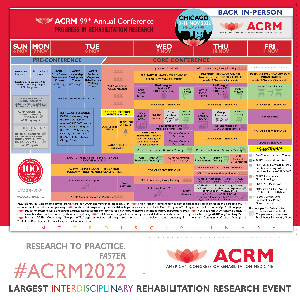Back
Pediatric Rehabilitation
Factors Affecting Resiliency in Outpatient Pediatric Occupational Therapist
Factors Affecting Resiliency in Outpatient Pediatric Occupational Therapists
Thursday, November 10, 2022
3:24 PM – 3:29 PM
Location: Station 6

Rachel Allen-McHugh, OTD, OTR/L, RYT, CEIM
Assistant Professor
Drake University-Occupational Therapy Program
Adel, Iowa, United States
Presenting Author(s)
Research Objectives: 1. To investigate the resilience of pediatric occupational therapy practitioners during the Covid-19 pandemic.
2. To investigate the factors that may contribute to resilience levels in occupational therapists.
Design: This short-term, mixed-methods study utilized an electronic survey that consisted of demographic, qualitative, and quantitative questions to examine what factors were in place to aid in the overall resilience of pediatric occupational therapy practitioners working in an outpatient setting.
Setting: Study setting included a pediatric outpatient clinic located in the suburbs of a small, midwestern city.
Participants: A voluntary response sample was recruited from an outpatient pediatric therapy clinic in Iowa. Eleven (n=11) occupational therapy practitioners met the inclusion criteria and completed at least 50% of the survey.
Interventions: Participants voluntarily completed the electronic survey that was shared via an anonymous survey link. Twenty-one survey questions collected demographic, qualitative, and quantitative data.
Main Outcome Measures: The survey included ten questions adapted from the Life Orientation Test-Revised (LOT-R) which is used to measure optimism versus pessimism. Four additional qualitative questions were included to assess protective factors for psychosocial resilience and implications resulting from the Covid-19 pandemic.
Results: The results of the LOT-R demonstrated that the participants who had prior resilience training did not display a greater level of resilience or perceived ability to overcome adversity when compared to those who did not have prior resilience training. Positive resilience themes that emerged from the qualitative data include having a support system, practicing safety precautions, and taking life one day at a time.
Conclusions: Future research should consider factors that support caregivers, specifically occupational therapy practitioners and their quality of life. By understanding what factors contribute to resilience levels, these factors can further be implemented and supported in the workplace environment. Targeted education and training for practitioners focused on resilience building should be considered. This implementation could lead to stronger support networks and reduced burnout and compassion fatigue resulting in better resilience outcomes.
Author(s) Disclosures: No known conflicts to declare.
2. To investigate the factors that may contribute to resilience levels in occupational therapists.
Design: This short-term, mixed-methods study utilized an electronic survey that consisted of demographic, qualitative, and quantitative questions to examine what factors were in place to aid in the overall resilience of pediatric occupational therapy practitioners working in an outpatient setting.
Setting: Study setting included a pediatric outpatient clinic located in the suburbs of a small, midwestern city.
Participants: A voluntary response sample was recruited from an outpatient pediatric therapy clinic in Iowa. Eleven (n=11) occupational therapy practitioners met the inclusion criteria and completed at least 50% of the survey.
Interventions: Participants voluntarily completed the electronic survey that was shared via an anonymous survey link. Twenty-one survey questions collected demographic, qualitative, and quantitative data.
Main Outcome Measures: The survey included ten questions adapted from the Life Orientation Test-Revised (LOT-R) which is used to measure optimism versus pessimism. Four additional qualitative questions were included to assess protective factors for psychosocial resilience and implications resulting from the Covid-19 pandemic.
Results: The results of the LOT-R demonstrated that the participants who had prior resilience training did not display a greater level of resilience or perceived ability to overcome adversity when compared to those who did not have prior resilience training. Positive resilience themes that emerged from the qualitative data include having a support system, practicing safety precautions, and taking life one day at a time.
Conclusions: Future research should consider factors that support caregivers, specifically occupational therapy practitioners and their quality of life. By understanding what factors contribute to resilience levels, these factors can further be implemented and supported in the workplace environment. Targeted education and training for practitioners focused on resilience building should be considered. This implementation could lead to stronger support networks and reduced burnout and compassion fatigue resulting in better resilience outcomes.
Author(s) Disclosures: No known conflicts to declare.
Learning Objectives:
- Upon completion, participant will be able to list factors that impact resilience in pediatric occupational therapy practitioners.
- Upon completion, participant will be able to describe the key-findings related to resources, interventions and protective factors that contribute to resilience levels.
- Upon completion, participant will be able to understand how the results of this study can be used in future research on resilience of occupational therapists and other health care professionals.

.jpg)
